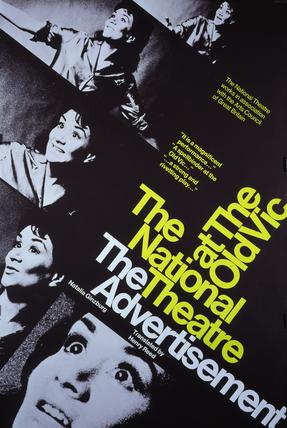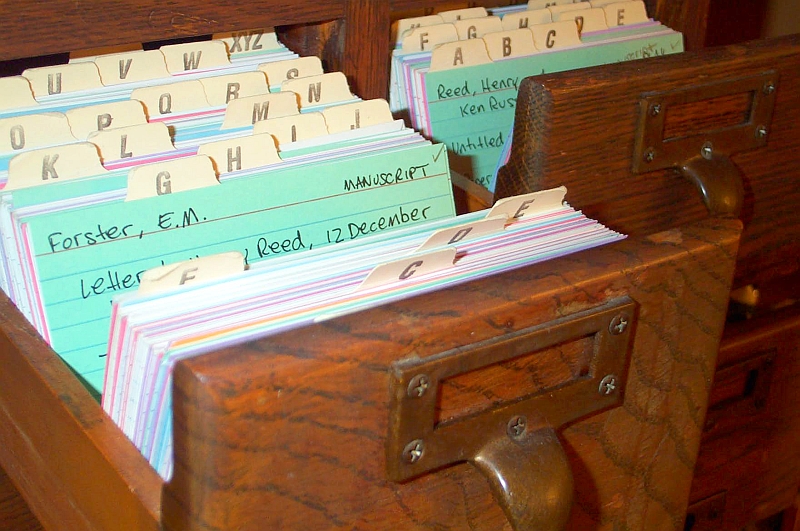|
Resurrection of the Programme CatalogueIt would appear the BBC Programme Catalogue has awoken from its long slumber, hungry for keywords to devour, eager to reveal its deepest secrets! Huzzah!
Live Search BooksMicrosoft has released in (βeta) their Live Search Books, which contains searchable scans of thousands of pre-1927 titles in the public domain. More information is available on Live Search's Weblog.
Unfortunately, for our purposes, this is slightly less than useful. Let's see: "Thomas Hardy." Good! "Ezra Pound." Okay. "T.S. Eliot?" Not so much. Oh, well. Microsoft has also gone live with Live Search Academic, their response to Google Scholar.
LeftoversI think, given the chance to do it over again, I'd rename this blog The Ghost of Hardy's Cat. (Indirectly, via Peter Stothard.)
Advertisement AdvertisementsDiehard fans of Joan Plowright (or Natalia Ginzburg) may be interested in these posters offered by the National Theatre Archive. They're from the 1968-69 run of Ginzburg's play, The Advertisement, translated and adapted by Reed. The production was directed by Donald MacKechnie and Sir Laurence Olivier, and starred (besides Dame Joan) Suzanne Vassey, Louise Purnell, Edward Petherbridge, Anna Carteret, and Sir Derek Jacobi.
The National Theatre also has an extensive, searchable catalog of performances and items in their archives.
Collected, At LastHere's an interesting bit of trivia: a Collected Poems of Henry Reed was proposed as early as 1979, seven years before his death.
The Archive of Carcanet Press is housed in the John Rylands University Library at the University of Manchester. The collection contains communications to and from Carcanet's editors, authors, and critics. In correspondence from between April 1979 and May 1980, editor Michael Schmidt, co-founder of the Press, and David Jesson-Dibley, go back-and-forth about current, possible, and future projects: Much of this relates to Robert Herrick's Selected poems, edited by Jesson-Dibley as part of the Fyfield series and published in 1980. Includes references to: Schmidt's initial suggestion that Jesson-Dibley undertake the project, and suggestions put forward by both men of potential poets for Jesson-Dibley to edit; the possibility of editing a Fyfield volume of Edward, Lord Herbert of Cherbury's verse; Jesson-Dibley's suggestion of a volume of lives and anecdotes of seventeenth-century poets; the ultimate selection of Herrick, and plans for the book's content and arrangement; his progress; and the contract. Other topics include: Jesson-Dibley's attempts to find a publisher for a novel he has written and Schmidt's advice on this; the possibility of Carcanet undertaking a Collected Poems of Henry Reed; a play Jesson-Dibley has completed called Ahab and his neighbours; his other work, including some teaching; and Schmidt's book An introduction to fifty modern poets (1979). I tracked down the library's copy of Fifty Modern British Poets, hoping that Schmidt may have granted Reed a special place among the lives of his peers. But all I found was a small, disappointing note in the editor's Preface: 'Had I been able to include sixty poets, I should have added essays on Robert Bridges, Arthur Symons, John Masefield, Siegfried Sassoon, Norman Cameron, Henry Reed, Seamus Heaney, Alun Lewis, Peter Scupham, and Roy Fisher.' In his book Reading Modern Poetry, Schmidt asks: 'Will Henry Reed ever be more than an anthology piece and a brilliant parody?' We'll see. Carcanet inherited Oxford University Press's Oxford Poets list in 1999, following OUP's decision to drop contemporary poetry. There is a glimmer that Carcanet intends to reissue Reed's Collected Poems as a paperback in 2007, bringing the book full-circle.
Possession and the Power of Index CardsI dug through my bookshelves tonight, hunting for my copy of A.S. Byatt's Possession. Ah, here it is: the trade paperback from before the (regretable) film version was released. I've read it twice, and the spine is creased and the corners dulled. When I first read the book, straight through in about two days, I was sure it was a masterpiece (despite the sometimes tedious Victorian verse). On second reading, I was dismayed that it didn't quite captivate me in the same way, and I attributed the discrepancy to my own deprivations the first time around.
It was Possession which originally inspired me to begin organizing the bibliography, first with 3x5 index cards, and then in a database. The obsessed scholars in the novel all keep detailed card indexes, in which they transcribe, outline, and keep track of the minute facts of the lives of their respective authors. Here is a scene between Roland Michell, a research assistant working for the editor of the collected papers of the (fictitious) poet, Randolph Henry Ash, and Beatrice Nest, gatekeeper to the journals of the poet's wife, Ellen Ash: Could I see your card index, Beatrice?" "Oh, I don't know, it's all a bit of a muddle, I have my own system, you know, Roland, for recording things, I think I'd better look myself, I can better understand my own hieroglyphics." She put on her reading glasses, which dangled over her embarrassment on a gilt-beaded chain. Now she could not see Roland at all, a state of affairs she marginally preferred, since she saw all male members of her quondam department as persecutors, and was unaware that Roland's own position there was precarious, that he hardly qualified as a full-blooded departmental male. She began to move things across her desk, a heavy wooden-handled knitting bag, several greying parcels of unopened books. There was a whole barbican of index boxes, thick with dust and scuffed with age, which she ruffled in interminably, talking to herself. "No, that one's chronological, no, that's only the reading habits, no that one's to do with the running of the house. Where's the master-box now? It's not complete for all notebooks you must understand. I've indexed some but not all, there is so much, I've had to divide it chronologically and under headings, here's the Calverley family, that won't do... now this might be it.... "Nothing under La Motte. No, wait a minute. Here. A cross-reference. We need the reading box. It's very theological, the reading box. It appears"—she drew out a dog-eared yellowing card, the ink blurring into its fuzzy surface—"it appears she read The Fairy Melusina, in 1872." She replaced the card in its box, and settled back in her chair, looking across at Roland with the same obfuscating comfortable smile. There you have it: the entirety of my formal training in literary research. I was brought back to Possession this evening by stumbling across Pile of Indexcards, which lovingly blogs, in painstaking detail, a similar system of organization. Indexcard + Tagging + Chronological order = "Indexcarding". Accompanied by a terrific photoset on Flickr. I particularly like the tagging and starring methods.
Hey, You Guys!I'm watching "The Electric Company's Greatest Hits & Bits" special, on PBS. "Easy Reader," "The Six Dollar and Thirty-Nine Cent Man," "The Adventures of Letterman." It's like my entire adolescence is being rebroadcast. Rita Moreno, hubba hubba! They opened with this gag, which is like a Shakespearean tragi-comedy, for eight-year-olds:
No. 38, with a BulletIn 1995, to coincide with National Poetry Day, BBC1's television program, "The Bookworm," conducted a six-day poll of the public, seeking Britain's favorite poem (Independent (London), 13 October 1995). 7,500 votes cast narrowed down 1,000 choices to the 100 best-loved poems. Henry Reed's "Lessons of the War" was ranked at #38:
1. Rudyard Kipling, "If"That puts things in perspective. Reed beats three Louis MacNeice poems by at least 22 places, is only outshone by Eliot's "Prufrock," beats John Betjeman, is only three slots below Dylan Thomas's "Do Not Go Gentle Into That Good Night," and even outranks his idol Thomas Hardy's best-known verses. These selections were published in 1996 as The Nation's Favourite Poems (Amazon.co.uk), and spawned something of an industry in poetry anthologies. It'd be interesting to see, in the polls taken in the following years, whether Reed rose, or fell, or (God forbid) fell off, altogether.
|
||||||||||||||||||||||||||||||
|
|
|||||||||||||||||||||||||||||||










